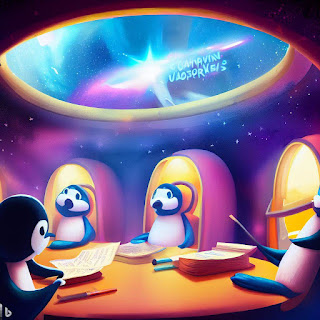The Quest for the Holy Grail of Open Source Licenses
Conquering a Zombie Metropolis
navigate: 1.7 << -- >> 2.1
Review of Concepts
Which version of the GNU Public License (GPL) contains clauses specifically designed to combat hardware restrictions?
A) GPL version 1
B) GPL version 2
C) GPL version 3
D) LGPL version 2
Question 2:
Which open source license is commonly used by developers for software libraries?
A) GNU Public License (GPL)
B) Lesser GPL (LGPL)
C) BSD license
D) Apache license
Question 3:
Which open source license allows code modifications to be distributed under other licenses?
A) GNU Public License (GPL)
B) BSD license
C) MIT license
D) Apache license
Question 4:
With which software system is the MIT license primarily associated?
A) GNU project
B) X Window System
C) Apache software
D) BSD OSs
Question 5:
Which open source license shares similarities with both the BSD and MIT licenses?
A) GNU Public License (GPL)
B) Lesser GPL (LGPL)
C) BSD license
D) Apache license
Question 6:
When was the Apache license first created?A) 1991
B) 1995
C) 2007
D) 2010Answers
Answers
Answer to Question 1:
Answer: C) GPL version 3
Explanation:
The text states that the GPLv3 differs from the GPLv2 as it includes
clauses intended to combat the use of hardware restrictions.
Answer to Question 2:
Answer: B) Lesser GPL (LGPL)
Explanation:
According to the text, the Lesser GPL (LGPL) is derived from the GPL
and is often used by developers for software libraries.
Answer to Question 3:
Answer: B) BSD license
Explanation: The text states that the BSD license allows code modifications to be distributed under other licenses.
Answer to Question 4:
Answer: B) X Window System
Explanation: The MIT license is associated with the X Window System, as mentioned in the text.
Answer to Question 5:
Answer: D) Apache license
Explanation:
The text states that the Apache license, like the BSD and MIT licenses,
handles software modification licensing in a similar manner.
Answer to Question 6:
Answer: B) 1995
Explanation: The text mentions that the Apache license was first created in 1995.
The Story
Introduction
Embark
on an extraordinary adventure as we delve into the realm of open source
licenses. In this thrilling journey, we will compare the various
licenses that govern the distribution and modification of software.
Brace yourself for an epic quest through a treacherous metropolis
infested with zombies, as we unveil the secrets behind the GNU Public
License (GPL), Lesser GPL (LGPL), BSD license, MIT license, and the
Apache license. Join us as we seek the Holy Grail of GPL and navigate
the perilous path of licensing knowledge.
Chapter 1: Unveiling the GPL and Its Transformative Journey
In
our first chapter, we set our sights on the GNU Public License (GPL),
the legendary license that revolutionized the open source world.
Discover the origins of GPL and its transformative power, as we delve
into the release of GPL version 2 in 1991. Witness the evolution of GPL
as it battles against the rising tide of hardware restrictions,
culminating in the grand unveiling of GPL version 3 in 2007.
Chapter 2: Conquering the Lesser GPL and Its Role in Software Libraries
As
we venture deeper into the metropolis, we encounter the Lesser GPL
(LGPL), a license derived from the mighty GPL. Learn how developers
utilize the LGPL for software libraries, enabling the creation of robust
and flexible code foundations. Uncover the strategic advantages of the
LGPL and its significance in the open source ecosystem.
Chapter 3: Navigating the BSD License in the Open Source BSD OSs
Our
journey takes a captivating turn as we explore the BSD license, a
distinctive license predominantly associated with the open source BSD
operating systems. Examine the unique characteristics of the BSD
license, including its allowance for code modifications to be
distributed under other licenses. Discover how this license has
contributed to the growth and development of the BSD OSs.
Chapter 4: Unleashing the Power of the MIT License and the X Window System
In
this chapter, we unlock the secrets of the MIT license, a compact yet
influential license associated with the renowned X Window System. Delve
into the origins of the MIT license and its role in promoting
collaborative code modifications. Explore the X Window System's impact
on the open source community and its permissive licensing approach.
Chapter 5: Mastering the Apache License and Its Alignment with BSD and MIT
Our
final stop brings us face-to-face with the Apache license, a license
that emerged in 1995 and shares similarities with the BSD and MIT
licenses. Understand the nuances of the Apache license and its handling
of software modification licensing. Witness its widespread adoption and
its significance in fostering open source innovation.
Conclusion: The Quest's End and the Holy Grail of GPL
As we conclude our daring adventure through the zombie-infested metropolis, we reflect upon the knowledge gained about open source licenses. Each license we encountered presented unique characteristics, allowing developers to choose the one that aligns with their project's goals. The Holy Grail of GPL symbolizes the power of collaborative code sharing and the spirit of open source. Armed with this newfound understanding, venture forth and navigate the licensing landscape with confidence, ensuring the continuous growth and innovation of the open source community.
